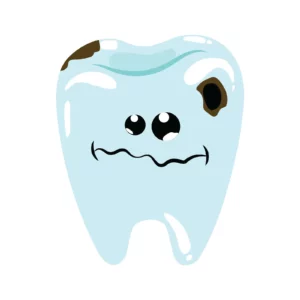


Dental cavities are common problems that can affect anyone, regardless of age. It’s important to detect and treat cavities early to avoid further complications. In this article, we will explain what dental cavities are, stress the significance of early treatment, and discuss the causes and how long can you leave a cavity untreated. A dental cavity, also called tooth decay or dental caries, is when a part of the tooth gets damaged. It happens when bacteria in our mouth produce acids that slowly dissolve the hard tissues of the tooth. These bacteria feed on sugars and starches found in the food we eat and form a sticky film called plaque on our teeth.
Detecting and treating cavities early is crucial to prevent more damage to the tooth. If left untreated, cavities can lead to various problems. At first, cavities may not show any noticeable signs, making it easy to miss them. But as they progress, you may experience symptoms such as toothache, sensitivity to hot or cold, pain while chewing, or dark spots on the affected tooth. Ignoring cavity treatment can have serious consequences for both oral health and overall well-being. If the decay reaches the inner layers of the tooth, it can cause a painful infection called a dental abscess. Untreated cavities can also result in tooth loss, affecting your ability to bite, chew, and speak properly, and impacting your self-esteem.
The time frame for leaving a cavity untreated varies depending on factors like oral hygiene, diet, and cavity characteristics. However, it’s generally not recommended to leave a cavity untreated for long. Cavities don’t heal on their own; they only get worse over time. Even a small cavity can grow and cause more damage if not treated promptly.
Dental cavities, also known as tooth decay or dental caries, are common problems that can harm our teeth. To prevent cavities, it’s important to know how they form and what factors contribute to their development. A cavity happens when the hard parts of our teeth, like the outer layer called enamel, get damaged. This damage is caused by acid made by bacteria in our mouths. These bacteria live in a sticky film called plaque that forms on our teeth. When we eat sugary or starchy foods, the bacteria in plaque feed on them and make acids. These acids attack the enamel and create cavities over time.
Not brushing and flossing our teeth well enough also allows plaque to build up. This lets the cavity-causing bacteria stick around and produce more acid. Eating foods and drinks that are high in sugar or carbohydrates also gives the bacteria more food to make acid from. Snacking or sipping on sugary things throughout the day can be especially harmful because it keeps the teeth exposed to acid for longer.

Other factors that can contribute to cavities include having a dry mouth, certain health conditions, or taking medications that weaken tooth enamel. Some people also have deeper crevices or grooves in their teeth, which can trap food and make it harder to clean properly. To prevent cavities, we can take steps to protect our teeth. This includes brushing our teeth with fluoride toothpaste, flossing every day, and going to the dentist for check-ups and cleanings. These actions help remove plaque and keep harmful bacteria away. We can also make better choices with our diet by eating less sugary and acidic foods and drinks.
Untreated cavities can cause various problems, so it’s important to recognize the signs and symptoms. If left untreated, cavities can lead to complications that affect both our oral health and overall well-being. One common sign of a cavity is a toothache, which can range from mild to severe pain. Sensitivity is another symptom, where the tooth becomes sensitive to hot, cold, or sweet foods. Discoloration or dark spots on the tooth may also indicate a cavity. Not getting cavities treated can lead to complications. Infections can happen when the cavity gets worse, causing pain, swelling, and sensitivity. A dental abscess, which is a pocket of pus, can also form and cause severe pain and swelling. Leave a cavity untreated can even result in tooth loss, as the tooth becomes weak and may need to be removed.
Ignoring cavities can have a bigger impact than just the affected tooth. It can make eating, speaking, and sleeping difficult. It can also affect our overall health and well-being. Poor oral health can lead to other problems like gum disease and increase the risk of serious health issues like heart disease and diabetes. To avoid complications, it’s important to recognize the signs of cavities and seek dental care promptly. Getting cavities treated early can prevent pain, infections, and tooth loss, and help maintain good oral and overall health.
Delaying treatment for cavities can have serious consequences for our oral health. Here’s what can happen if we put off getting cavities treated. Cavities get worse over time. What starts as a small decay can grow and go deeper into the tooth. This can cause increased sensitivity and pain. If we leave a cavity untreated, the decay can reach the inside of the tooth, leading to severe pain and potential infection. Leaving a cavity untreated poses risks. It can lead to infections that cause pain, swelling, and abscesses. The infection can spread to other teeth or gums, and there’s a higher chance of tooth loss.
Delaying treatment can also lead to more expensive procedures. Early-stage cavities can be treated with simple fillings, but as they progress, more invasive treatments like root canals or extractions may be needed. These procedures take more time, can be uncomfortable, and cost more. Not treating cavities also impacts daily life. It can cause pain, affect eating, sleeping, and speaking, and impact overall well-being. The need for additional treatments can add to the financial burden and affect quality of life.
Read Also: How Much Do Braces Hurt On A Scale 1-10?
Taking steps to prevent cavities and caring for our oral health can make a big difference. Here are some easy tips to help keep our teeth healthy and avoid cavities. First, maintaining good oral hygiene is essential. Brush your teeth at least twice a day with fluoride toothpaste. Use a soft-bristle toothbrush and brush gently in small circles. Don’t forget to clean your tongue too. Flossing every day is important to remove food particles and plaque from between your teeth. Making changes to our diet can also help prevent cavities. Try to limit sugary and acidic foods and drinks. Instead, choose a balanced diet with plenty of fruits, vegetables, and whole grains. Avoid snacking and sipping on sugary drinks throughout the day, as this exposes our teeth to constant acid attacks.
Fluoride is a superhero in cavity prevention. Use toothpaste with fluoride and drink water that has fluoride in it. Fluoride strengthens our tooth enamel and can even repair early signs of decay. Dental sealants are another protective measure. They are like thin coatings that can be applied to the chewing surfaces of our back teeth. Sealants help keep out plaque and bacteria. Regular dental check-ups are important too. Dentists can catch cavities early, clean our teeth professionally, and give advice on how to take care of our oral health. To avoid these consequences, it’s important to seek dental care promptly. By addressing cavities early, we can prevent them from getting worse, reduce the risk of complications, and save money.
Read Also: What Is The Strongest Natural Antibiotic For Tooth Infection?
Taking care of our teeth and addressing cavities early is important for a healthy smile and overall well-being. By understanding what causes cavities, the problems they can cause, and how to prevent them, we can protect our teeth and save ourselves from future troubles. If we ignore or delay getting cavities treated, we can experience more pain and need expensive dental treatments. Leave a cavity untreated can make everyday activities like eating, speaking, and sleeping difficult. They can even make us feel less confident about our smile.
To prevent cavities, it’s important to take preventive measures and care for our teeth. This means brushing and flossing regularly, eating a balanced diet, and using fluoride toothpaste and dental sealants. These simple steps help strengthen our teeth and keep harmful bacteria away. It’s also important to visit the dentist regularly for check-ups and professional cleanings. Remember, even though we can do our best to prevent cavities, it’s still important to see a dentist. They can catch cavities early and give us personalized advice for our oral health.